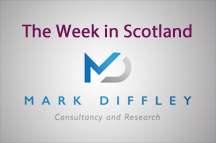 A win is a win?
A win is a win?
Along with the rest of Britain, people in Scotland awoke last Friday morning, scratched their heads and collectively cried 'what the hell happened there?'
In truth, while the polls here did pick up on the Tory surge and, latterly, the Corbyn bounce to Labour, the scale of the seat losses suffered by the SNP came as a surprise. That these 21 defeats included the symbolically important names of former First Minister Alex Salmond and SNP leader at Westminster Angus Robertson, only served to compound the disappointment for Nicola Sturgeon and her troops.
It is of course worth reiterating that the SNP won more seats (35) than all the other parties combined (24) and that matching or exceeding the 2015 haul of 56 seats was near impossible, but politics is about momentum and it is the Tories, and to some extent Labour, which currently have that commodity.
The analysis
We don't know yet what explains the result in Scotland but it is likely to be down to a combination of factors, including a potential second independence referendum, fallout from Brexit, the rise in popularity of Labour and Jeremy Corbyn and perceived performance of the Scottish Government on domestic issues, especially education.
 The 12 Tory gains are likely to have come largely as a result of their relentless positioning as the staunchest defenders of the union and their hammering of a 'no to a second independence referendum' message. This led to an odd campaign where supporters of independence dare not mention the prospect of a second referendum, while those who oppose it barely mentioned anything else. Of course this is because polling on the issue, including one released this week, consistently shows the majority of Scots are not in favour of another referendum any time soon.
The 12 Tory gains are likely to have come largely as a result of their relentless positioning as the staunchest defenders of the union and their hammering of a 'no to a second independence referendum' message. This led to an odd campaign where supporters of independence dare not mention the prospect of a second referendum, while those who oppose it barely mentioned anything else. Of course this is because polling on the issue, including one released this week, consistently shows the majority of Scots are not in favour of another referendum any time soon.
And while the central belt and urban heartlands of Scotland remain solidly yellow, Labour had a good night, gaining 6 seats. This is most likely to be the result of similar movements to Labour observed in other parts of Britain, reflecting the popularity of many of the party's flagship manifesto pledges and the widely perceived positive campaign ran by Jeremy Corbyn. Meanwhile, the Liberal Democrat's reputation for targeting resources on a small number of winnable seats was enhanced, returning to Westminster with an additional three MPs, most notably the re-election of Jo Swinson in East Dunbartonshire. She may well be in contention for the UK leadership position vacated by Tim Farron earlier this week.
The result is that the SNP remain dominant but Scottish representation at Westminster has more of a rainbow feel to it than after 2015.
The fallout
The result has significant implications, particularly for the SNP and the Conservatives. Having conceded that talk of indyref2 may have impacted on the election result, the First Minster faces pressure to delay or postpone such a vote. She has promised a period of reflection before deciding what to do next. Although most commentators believe that the preferred timescale will be pushed back to reflect public opinion, the First Minister has been adamant that she will not be bounced into an early decision, and will face pressure from some elements within her party and the wider independence movement to maintain the current position and timetable.
Meanwhile, the Tory surge in Scotland has been largely credited with keeping the Prime Minister in power, even if by her fingertips! This gives Scottish Conservative leader Ruth Davidson considerable sway at UK level and she has already flexed her muscles in expressing discomfort about the potential deal with the DUP, and in advocating what she has dubbed an 'Open Brexit', before the negotiations with the EU formally begin next week. Despite riding this current wave however, there are potential dangers ahead for the Scottish Conservatives; much depends on what is in the Queen's Speech next Wednesday and how Brexit talks progress, but we do know that the support of the Tories from north of the border will be crucial in determining how long the government can last.
Same old Scotland
And while politics and elections have dominated here this week, the latest instalment of the oldest and fiercest rivalry in international football provided an entertaining distraction at Hampden at the weekend. For a fleeting moment the country experienced euphoria as two exceptional free kicks from Leigh Griffiths late on Saturday gave Scotland the edge. As ever though, disappointment prevailed as an England equaliser deep into injury time ended hopes of a rare victory over the auld enemy and, with it, any lingering dream of reaching next year’s World Cup. Next time.














